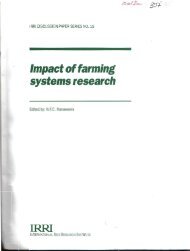Naz, Antonia Corinthia C and Mario Tuscan N. Naz. 2006. Modeling ...
Naz, Antonia Corinthia C and Mario Tuscan N. Naz. 2006. Modeling ...
Naz, Antonia Corinthia C and Mario Tuscan N. Naz. 2006. Modeling ...
Create successful ePaper yourself
Turn your PDF publications into a flip-book with our unique Google optimized e-Paper software.
1.2. Objectives of the Study<br />
General Objective: To determine how suburban municipalities like Tuba, Benguet in<br />
the Philippines can finance ecological solid waste management (ECOSWAM) services<br />
through user fees.<br />
Specific Objectives: Specifically, this EEPSEA study aimed to:<br />
i. Determine the choices of the people of Tuba, Benguet, namely, the (a)<br />
households <strong>and</strong> (b) business establishments, on the attributes of different ECOSWAM<br />
options or programs such as waste collector <strong>and</strong> collection vehicle, waste segregation,<br />
collection frequency, type or location of waste collection <strong>and</strong> mode of payment <strong>and</strong> the<br />
garbage or user fee that they are willing to pay for each option;<br />
ii. Formulate econometric models describing the relationship between the utility<br />
the respondents shall derive from their preference or choice of ECOSWAM service<br />
options <strong>and</strong> the determinants of these preferences or choices;<br />
iii. Estimate the welfare effects, i.e., the implicit prices or the marginal willingnessto-pay<br />
of the people of Tuba for an additional unit of a non-market (non-price) attribute<br />
of an ECOSWAM service option;<br />
iv. Estimate the potential revenues from the proposed garbage or user fees from (a)<br />
households <strong>and</strong> (b) business establishments in Tuba; <strong>and</strong><br />
v. Determine the funding gap, if any, between the potential revenues from the<br />
garbage fees <strong>and</strong> the estimated maintenance <strong>and</strong> operating costs (MOC) of the<br />
ECOSWAM services.<br />
1.3. Policy, Scientific Relevance <strong>and</strong> Significance of the Study<br />
The study shall provide the Tuba municipal government with a guide for decisionmaking<br />
<strong>and</strong> policy formulation on the choice of the option(s) for ECOSWAM, the<br />
setting of the garbage user fees, the costs of the ECOSWAM service options <strong>and</strong> the<br />
additional amount that it will have to raise in order to finance its ECOSWAM services.<br />
This study shall be used as the basis for the formulation of their ECOSWAM ordinances<br />
<strong>and</strong> shall provide inputs to the Tuba ECOSWAM plan. This is the first study in the<br />
country that uses the stated preference method: choice modeling to determine the<br />
preferences of people on ECOSWAM services in a suburban municipality. Thus, it shall<br />
serve as a comparative study with other studies that used the same methodology in other<br />
countries, e.g., Malaysia (see J. Othman, EEPSEA 2002).<br />
4<br />
2.0 REVIEW OF RELATED STUDIES<br />
2.1. Dem<strong>and</strong> <strong>and</strong> Willingness to Pay for Solid Waste Management Services
















